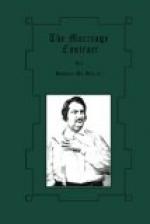“You may feel quite satisfied,” continued Solonet. “There are so many enterprises going on in Bordeaux at this moment that investments for annuities can be negotiated on very advantageous terms. After deducting from the proceeds of the house and furniture the hundred and fifty thousand francs we owe you, I think I can guarantee to madame that two hundred and fifty thousand will remain to her. I take upon myself to invest that sum in a first mortgage on property worth a million, and to obtain ten per cent for it,—twenty-five thousand francs a year. Consequently, we are marrying on nearly equal fortunes. In fact, against your forty-six thousand francs a year, Mademoiselle Natalie brings you forty thousand a year in the Five-per-cents, and one hundred and fifty thousand in a round sum, which gives, in all, forty-seven thousand francs a year.”
“That is evident,” said Paul.
As he ended his speech, Solonet had cast a sidelong glance at his client, intercepted by Mathias, which meant: “Bring up your reserves.”
“But,” exclaimed Madame Evangelista, in tones of joy that did not seem to be feigned, “I can give Natalie my diamonds; they are worth, at least, a hundred thousand francs.”
“We can have them appraised,” said the notary. “This will change the whole face of things. Madame can then keep the proceeds of her house, all but fifty thousand francs. Nothing will prevent Monsieur le comte from giving us a receipt in due form, as having received, in full, Mademoiselle Natalie’s inheritance from her father; this will close, of course, the guardianship account. If madame, with Spanish generosity, robs herself in this way to fulfil her obligations, the least that her children can do is to give her a full receipt.”
“Nothing could be more just than that,” said Paul. “I am simply overwhelmed by these generous proposals.”
“My daughter is another myself,” said Madame Evangelista, softly.
Maitre Mathias detected a look of joy on her face when she saw that the difficulties were being removed: that joy, and the previous forgetfulness of the diamonds, which were now brought forward like fresh troops, confirmed his suspicions.
“The scene has been prepared between them as gamblers prepare the cards to ruin a pigeon,” thought the old notary. “Is this poor boy, whom I saw born, doomed to be plucked alive by that woman, roasted by his very love, and devoured by his wife? I, who have nursed these fine estates for years with such care, am I to see them ruined in a single night? Three million and a half to be hypothecated for eleven hundred thousand francs these women will force him to squander!”




